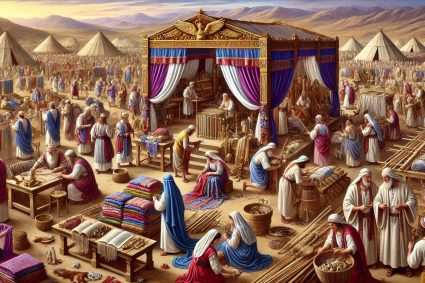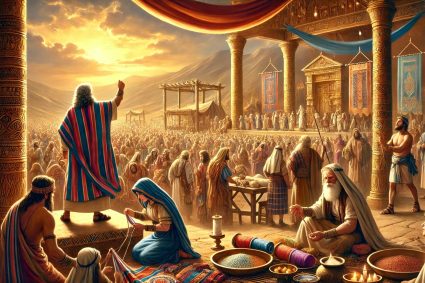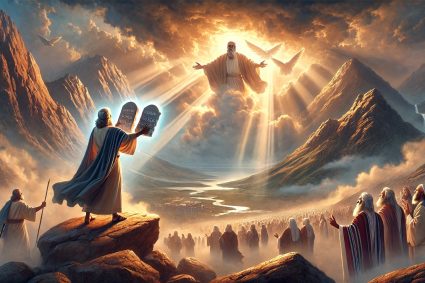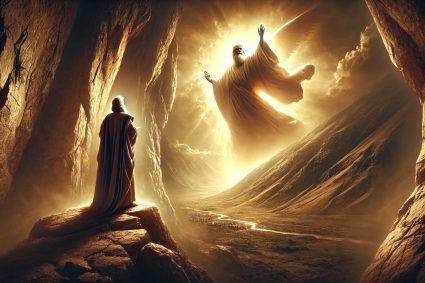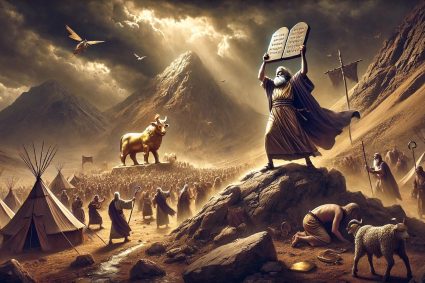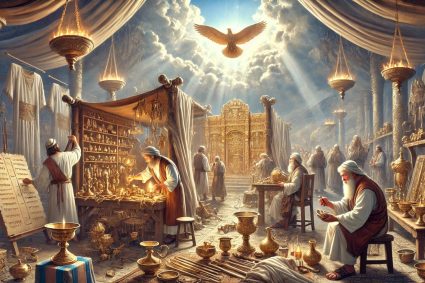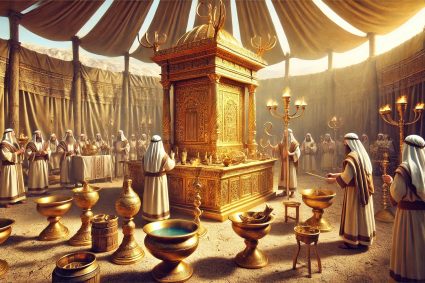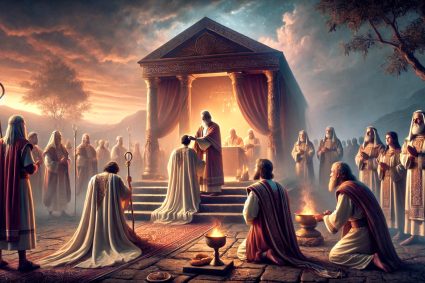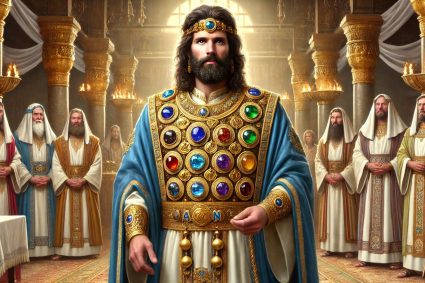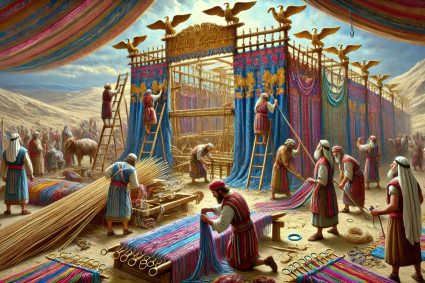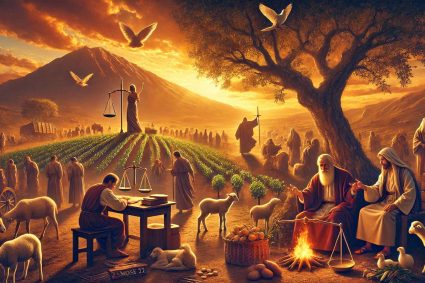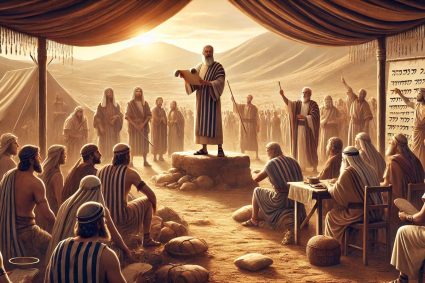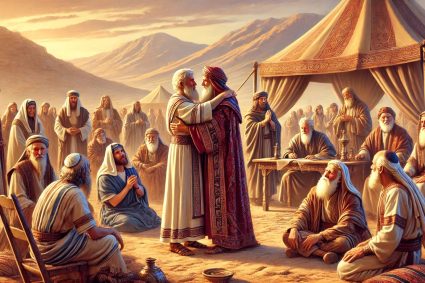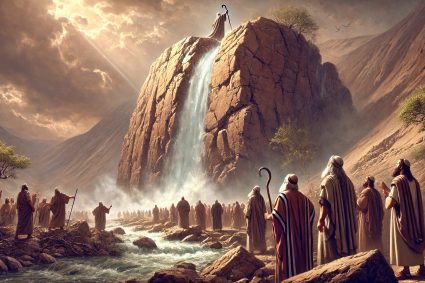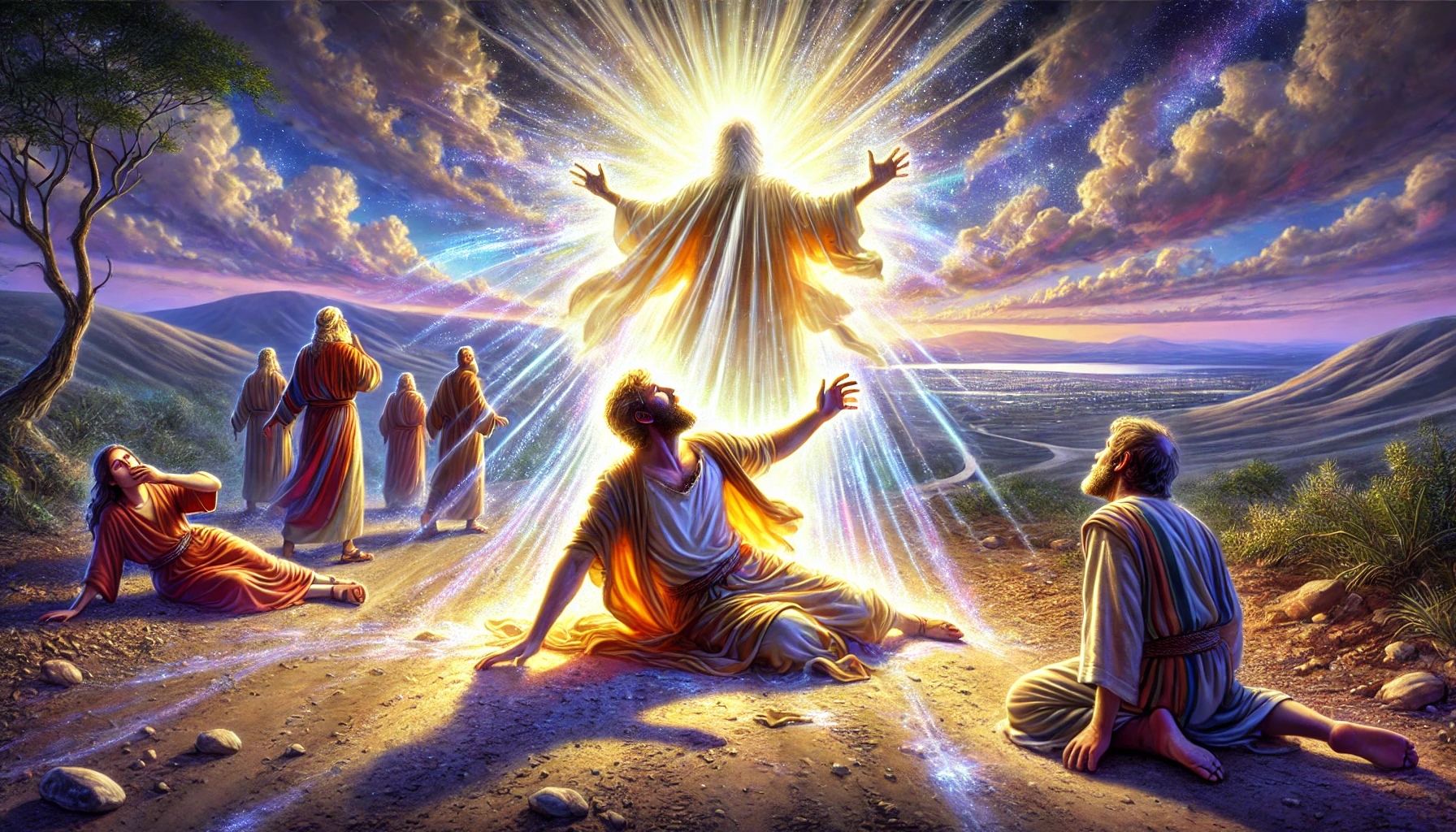
November 5, 2024
DAILY BIBLE READING – Acts Chapter 9
1 And Saul, yet breathing out threatenings and slaughter against the disciples of the Lord, went unto the high priest,
2 And desired of him letters to Damascus to the synagogues, that if he found any of this way, whether they were men or women, he might bring them bound unto Jerusalem.
3 And as he journeyed, he came near Damascus: and suddenly there shined round about him a light from heaven:
4 And he fell to the earth, and heard a voice saying unto him, Saul, Saul, why persecutest thou me?
5 And he said, Who art thou, Lord? And the Lord said, I am Jesus whom thou persecutest: it is hard for thee to kick against the pricks.
6 And he trembling and astonished said, Lord, what wilt thou have me to do? And the Lord said unto him, Arise, and go into the city, and it shall be told thee what thou must do.
7 And the men which journeyed with him stood speechless, hearing a voice, but seeing no man.
8 And Saul arose from the earth; and when his eyes were opened, he saw no man: but they led him by the hand, and brought him into Damascus.
9 And he was three days without sight, and neither did eat nor drink.
10 And there was a certain disciple at Damascus, named Ananias; and to him said the Lord in a vision, Ananias. And he said, Behold, I am here, Lord.
11 And the Lord said unto him, Arise, and go into the street which is called Straight, and enquire in the house of Judas for one called Saul, of Tarsus: for, behold, he prayeth,
12 And hath seen in a vision a man named Ananias coming in, and putting his hand on him, that he might receive his sight.
13 Then Ananias answered, Lord, I have heard by many of this man, how much evil he hath done to thy saints at Jerusalem:
14 And here he hath authority from the chief priests to bind all that call on thy name.
15 But the Lord said unto him, Go thy way: for he is a chosen vessel unto me, to bear my name before the Gentiles, and kings, and the children of Israel:
16 For I will shew him how great things he must suffer for my name’s sake.
17 And Ananias went his way, and entered into the house; and putting his hands on him said, Brother Saul, the Lord, even Jesus, that appeared unto thee in the way as thou camest, hath sent me, that thou mightest receive thy sight, and be filled with the Holy Ghost.
18 And immediately there fell from his eyes as it had been scales: and he received sight forthwith, and arose, and was baptized.
19 And when he had received meat, he was strengthened. Then was Saul certain days with the disciples which were at Damascus.
20 And straightway he preached Christ in the synagogues, that he is the Son of God.
21 But all that heard him were amazed, and said; Is not this he that destroyed them which called on this name in Jerusalem, and came hither for that intent, that he might bring them bound unto the chief priests?
22 But Saul increased the more in strength, and confounded the Jews which dwelt at Damascus, proving that this is very Christ.
23 And after that many days were fulfilled, the Jews took counsel to kill him:
24 But their laying await was known of Saul. And they watched the gates day and night to kill him.
25 Then the disciples took him by night, and let him down by the wall in a basket.
26 And when Saul was come to Jerusalem, he assayed to join himself to the disciples: but they were all afraid of him, and believed not that he was a disciple.
27 But Barnabas took him, and brought him to the apostles, and declared unto them how he had seen the Lord in the way, and that he had spoken to him, and how he had preached boldly at Damascus in the name of Jesus.
28 And he was with them coming in and going out at Jerusalem.
29 And he spake boldly in the name of the Lord Jesus, and disputed against the Grecians: but they went about to slay him.
30 Which when the brethren knew, they brought him down to Caesarea, and sent him forth to Tarsus.
31 Then had the churches rest throughout all Judaea and Galilee and Samaria, and were edified; and walking in the fear of the Lord, and in the comfort of the Holy Ghost, were multiplied.
32 And it came to pass, as Peter passed throughout all quarters, he came down also to the saints which dwelt at Lydda.
33 And there he found a certain man named Aeneas, which had kept his bed eight years, and was sick of the palsy.
34 And Peter said unto him, Aeneas, Jesus Christ maketh thee whole: arise, and make thy bed. And he arose immediately.
35 And all that dwelt at Lydda and Saron saw him, and turned to the Lord.
36 Now there was at Joppa a certain disciple named Tabitha, which by interpretation is called Dorcas: this woman was full of good works and almsdeeds which she did.
37 And it came to pass in those days, that she was sick, and died: whom when they had washed, they laid her in an upper chamber.
38 And forasmuch as Lydda was nigh to Joppa, and the disciples had heard that Peter was there, they sent unto him two men, desiring him that he would not delay to come to them.
39 Then Peter arose and went with them. When he was come, they brought him into the upper chamber: and all the widows stood by him weeping, and shewing the coats and garments which Dorcas made, while she was with them.
40 But Peter put them all forth, and kneeled down, and prayed; and turning him to the body said, Tabitha, arise. And she opened her eyes: and when she saw Peter, she sat up.
41 And he gave her his hand, and lifted her up, and when he had called the saints and widows, presented her alive.
42 And it was known throughout all Joppa; and many believed in the Lord.
43 And it came to pass, that he tarried many days in Joppa with one Simon a tanner.
King James Version. Public Domain
Commentary
Introduction
Acts Chapter 9 describes one of the most significant conversion stories in the Bible: the transformation of Saul, a determined persecutor of Christians, into Paul, a fervent apostle of Christ. This chapter not only highlights the personal miracle of conversion but also illuminates the profound impact on the early church and the dynamics of faith and grace. Further accounts of miracles performed by the Apostle Peter follow, strengthening the Christian community and contributing to the spread of faith. The stories of Saul, Aeneas, and Tabitha illustrate how God calls people and, through miraculous signs, reinforces faith and trust among believers.
Commentary
Acts Chapter 9 marks a turning point in biblical history, showcasing how an enemy of the faith becomes one of its most passionate proclaimers through a direct encounter with Christ. Saul, initially filled with threats and violence against Jesus’ followers, zealously pursues those who follow the new “Way” of Christianity. His conversion begins when, on his journey to Damascus, he is blinded by a heavenly light and hears the voice of Jesus, who directly calls him to account. The question, “Saul, Saul, why are you persecuting me?” reveals the deep bond between Jesus and his followers, showing how any persecution against believers is considered persecution against Christ himself. This experience humbles Saul and temporarily leaves him blind, symbolizing his spiritual blindness and his need for inner transformation.
The appearance of the disciple Ananias emphasizes the importance of obedience and trust in God’s guidance. Although Ananias initially hesitates to approach Saul because of his infamous reputation, he nevertheless follows the divine instruction and becomes an instrument for Saul’s healing. The theme of faith overcoming human fear and prejudice is strongly emphasized here. Saul’s healing and baptism are not merely physical events but symbols of his new spiritual direction. From a persecutor, he transforms into a fervent preacher who boldly proclaims Jesus’ name, astonishing and perplexing the people. Saul’s conversion demonstrates the transformative power of faith and the potential to turn even the staunchest opponents of God into instruments of the gospel through grace.
The Christian community initially meets Saul with skepticism and distrust. This is understandable, given that Saul had previously made a name for himself through violent actions against Christians. However, Barnabas, an influential believer, vouches for Saul and attests to his conversion, enabling his acceptance into the community. This act of trust and advocacy is a powerful example of how the Christian community grows through forgiveness and reconciliation.
The latter part of the chapter shifts focus to Peter, highlighting his healing and life-restoring power granted by the Holy Spirit. The healing of the paralyzed Aeneas in Lydda and the resurrection of Tabitha in Joppa are miracles that strengthen the faith of believers and lead the community closer to God. Especially the resurrection of Tabitha, known for her compassion and good deeds, demonstrates divine power over life and death and underscores the importance of service to others. Peter is presented here as a conduit for divine miracles, visibly manifesting the power of Jesus through the apostles and bringing many new believers to faith.
In summary, Acts 9 illustrates how, through grace and obedience, people from different backgrounds and walks of life—from Saul the persecutor to Tabitha the compassionate—become instruments of God. The miracles and signs are not only acts of faith but also means to strengthen the faith and trust of early Christians and further the spread of the gospel.
Summary
Acts 9 describes the conversion of Saul, who, on his way to Damascus, is confronted by Jesus in a vision, transforming him from a persecutor of Christians into a zealous preacher of the gospel. After an encounter with the disciple Ananias, who aids in his healing and baptism, Saul immediately begins to proclaim Christ. Despite the Christians’ initial mistrust, the community ultimately accepts him after Barnabas vouches for him. Meanwhile, the Apostle Peter performs further miracles in the cities of Lydda and Joppa: he heals the paralyzed Aeneas and raises the deceased Tabitha to life, inspiring many to turn to faith and strengthening the Christians’ belief. This chapter highlights the transformative power of faith and the work of the Holy Spirit in the early church.
![]()

WEEKLY SPIRIT OF PROPHECY READING – Ellen White | The Desire of Ages
Chapter 74—Gethsemane
This chapter is based on Matthew 26:36-56; Mark 14:32-50; Luke 22:39-53; John 18:1-12.
Read online here
Commentary
Introduction:
Chapter 74, “Gethsemane,” leads us into the deepest and most moving episode in the life of Jesus: the prayer and inner struggle in the Garden of Gethsemane, immediately before His arrest. The Gospel accounts of Matthew, Mark, Luke, and John depict how Jesus, accompanied by His closest disciples, goes to Gethsemane at night and prepares for the impending suffering. This scene reveals the painful inner conflict that Jesus experiences in His human nature as He willingly takes on the burden of the world’s sins. Here in Gethsemane, His absolute dedication and obedience to the Father’s will become intensely visible. The disciples, exhausted and inattentive, fall asleep while Jesus engages in the most bitter spiritual struggle of His life. Gethsemane becomes the epitome of His sacrifice and His unparalleled love for humanity.
Commentary:
Jesus’ prayer in Gethsemane is a portrayal of deepest devotion and pain. Here, we encounter a side of Jesus that is both human and divine: He wrestles with the burden of sin that threatens to separate Him from the presence of God. This scene reveals that Jesus, although divine, truly endures the wrath and consequences of human sin in His human nature. The words “Father, if it is possible, let this cup pass from me” demonstrate His anguish and simultaneously His willingness to follow God’s will, predestining Him as the sin offering for humanity.
Jesus’ dedication is all the more remarkable in light of the weakness of His disciples. He urges them to stay awake and pray, yet three times He returns to find them asleep. This scene highlights human frailty in the face of spiritual reality and accentuates Jesus’ loneliness and determination. The angels who appear to Him at the end serve as the final divine encouragement before He embarks on the painful path to the cross. Through this episode, it becomes clear that Jesus, fully aware of the magnitude of His sacrifice, resolutely continues the path to the redemption of humanity.
The climax comes when Jesus confronts His betrayers and the armed crowd without using divine power to defend Himself or flee. Instead, He faces His impending fate calmly and steadfastly. His example in Gethsemane is a powerful image of self-sacrifice and obedience to God’s will, regardless of personal pain and suffering.
Summary:
Chapter 74 describes the events in the Garden of Gethsemane, where Jesus experiences the most severe inner struggle of His life before His suffering and crucifixion. In deep prayer, He wrestles with the burden of humanity’s sins and the separation from the Father that sin brings. Despite His anguish, He decides to fulfill the Father’s will and drink the “cup” that lies ahead. The disciples who accompany Him fail to stay awake and fall asleep despite His pleas. After a final prayer, Jesus receives divine strength from an angel that fortifies Him for His journey. When the soldiers and the betrayer Judas arrive, Jesus faces them without resistance and is taken captive. The scene in Gethsemane highlights Jesus’ willingness to sacrifice and dedication, becoming the symbolic center of His suffering for humanity.
(Visited 15 times, 1 visits today)

